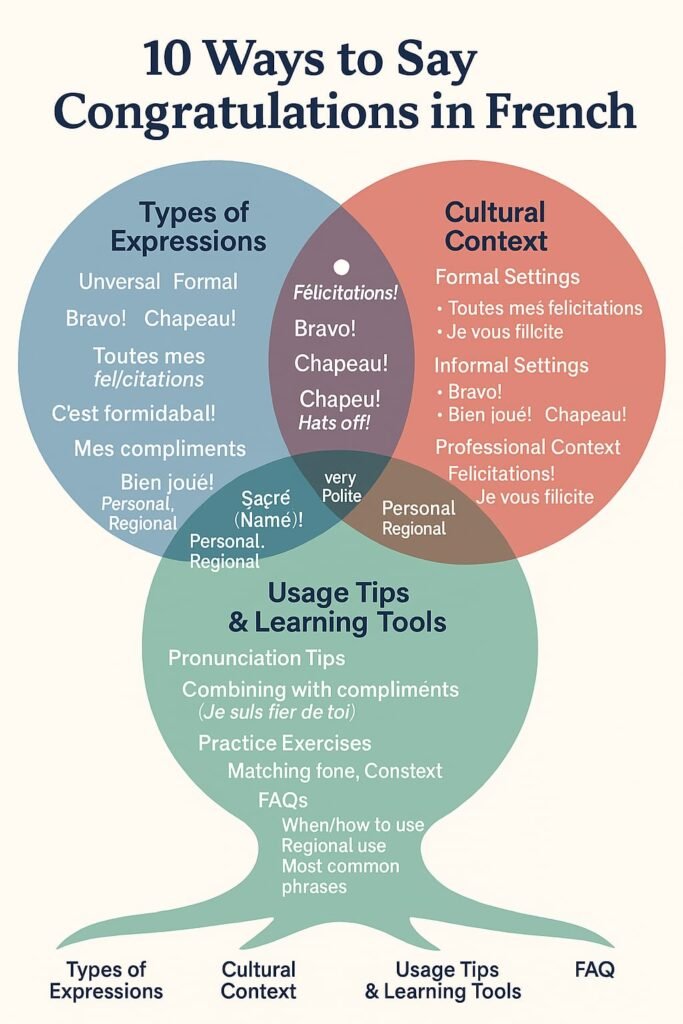Learning how to express congratulations in different languages opens doors to meaningful cultural connections. French, being one of the world’s most romantic and sophisticated languages, offers numerous elegant ways to celebrate others’ achievements. Whether you’re attending a French wedding, congratulating a colleague on a promotion, or celebrating academic success, knowing the right French expressions will help you connect authentically with French speakers.
This comprehensive guide explores 10 essential ways to say congratulations in French, complete with pronunciation tips, cultural context, and practical usage examples. By mastering these expressions, you’ll demonstrate cultural awareness and linguistic sophistication that native French speakers truly appreciate.

Table of Contents
ToggleWhy Learning French Congratulations Matters
Understanding how to congratulate someone in French properly goes beyond simple vocabulary memorization. It reflects cultural sensitivity and shows respect for French social customs. French culture places significant emphasis on appropriate expressions for different occasions, and using the correct congratulatory phrase can make or break social interactions.
Moreover, French congratulations often carry subtle nuances that English equivalents don’t capture. These expressions can convey varying degrees of formality, intimacy, and cultural specificity that demonstrate your French language skills and cultural understanding.
1. Félicitations! — The Universal Congratulations
Pronunciation: [feh-lee-see-tah-SYOHN]
“Félicitations!” is the most common and versatile way to say congratulations in French. This expression works in virtually any celebratory context and is appropriate for both formal and informal situations.
Usage examples:
- “Félicitations pour votre promotion!” (Congratulations on your promotion!)
- “Félicitations pour votre mariage!” (Congratulations on your wedding!)
- “Félicitations! Vous avez réussi!” (Congratulations! You succeeded!)
This expression is safe to use when you’re unsure about the appropriate level of formality. According to the French Academy, “félicitations” remains the most widely accepted congratulatory expression across all French-speaking regions.
2. Bravo! — Enthusiastic Praise
Pronunciation: [brah-VOH]
“Bravo!” expresses enthusiastic approval and admiration for someone’s performance or achievement. While originally Italian, this expression has been fully adopted into French vocabulary and carries the same celebratory energy.
When to use “Bravo!”:
- After a musical or theatrical performance
- Celebrating sporting achievements
- Acknowledging exceptional work or creativity
- Expressing immediate, spontaneous approval
Example: “Bravo pour votre présentation! C’était magnifique!” (Bravo for your presentation! It was magnificent!)
3. Chapeau! — Impressive Achievement Recognition
Pronunciation: [shah-POH]
Literally meaning “hat,” this colloquial expression translates to “hats off!” in English. “Chapeau!” acknowledges particularly impressive or difficult achievements and shows genuine respect for someone’s accomplishment.
Perfect for:
- Recognizing challenging achievements
- Acknowledging someone’s skill or talent
- Informal congratulations among friends
- Expressing admiration for perseverance
Example: “Chapeau! Vous avez terminé le marathon en moins de trois heures!” (Hats off! You finished the marathon in under three hours!)
Ready to perfect your French conversational skills? Our expert French tutors will help you master these expressions and much more through personalized lessons.
4. Toutes mes félicitations — Formal Congratulations
Pronunciation: [toot meh feh-lee-see-tah-SYOHN]
“Toutes mes félicitations” translates to “all my congratulations” and represents the most formal way to congratulate someone in French. This expression is particularly appropriate for significant life events, professional achievements, and formal occasions.
Ideal situations:
- Wedding congratulations
- Academic graduations
- Professional promotions
- Award ceremonies
- Business communications
Example: “Toutes mes félicitations pour l’obtention de votre diplôme!” (All my congratulations on obtaining your diploma!)
5. Je vous félicite — Personal Congratulations
Pronunciation: [zhuh voo feh-lee-SEET]
“Je vous félicite” means “I congratulate you” and adds a personal touch to your congratulations. This phrase works well in both formal and semi-formal contexts and can be followed by “pour” (for) and a specific reason.
Usage variations:
- “Je te félicite” (informal “you”)
- “Je vous félicite chaleureusement” (I warmly congratulate you)
- “Je vous félicite sincèrement” (I sincerely congratulate you)
Example: “Je vous félicite pour votre excellent travail sur ce projet!” (I congratulate you on your excellent work on this project!)
6. C’est formidable! — That’s Wonderful!
Pronunciation: [say for-mee-DAH-bluh]
While not exclusively a congratulatory phrase, “C’est formidable!” expresses genuine excitement and approval about someone’s news or achievement. This expression conveys enthusiasm and emotional support.
Alternative expressions:
- “C’est fantastique!” (That’s fantastic!)
- “C’est merveilleux!” (That’s marvelous!)
- “C’est génial!” (That’s great! — more casual)
Example: “Vous avez obtenu le poste? C’est formidable!” (You got the job? That’s wonderful!)
7. Mes compliments — My Compliments
Pronunciation: [meh kohn-plee-MAHN]
“Mes compliments” offers a sophisticated way to acknowledge someone’s achievement while maintaining elegant formality. This expression is particularly suitable for professional settings and cultural events.
Perfect for:
- Acknowledging artistic achievements
- Professional accomplishments
- Intellectual achievements
- Cultural performances
Example: “Mes compliments pour votre conférence! Elle était très instructive.” (My compliments on your lecture! It was very instructive.)
8. Bien joué! — Well Done/Well Played!
Pronunciation: [bee-ahn zhoo-EH]
“Bien joué!” literally means “well played” and works perfectly for congratulating someone on their performance, strategy, or skillful handling of a situation. This expression is common in both sports and everyday contexts.
Usage contexts:
- Sports and games
- Strategic achievements
- Clever solutions to problems
- Skillful performance in any area
Example: “Bien joué! Vous avez géré cette situation difficile avec beaucoup d’habileté.” (Well done! You handled that difficult situation with great skill.)
9. Permettez-moi de vous féliciter — Allow Me to Congratulate You
Pronunciation: [per-meh-tay mwah duh voo feh-lee-see-TEH]
This highly formal expression translates to “allow me to congratulate you” and represents the pinnacle of polite, respectful congratulations in French. Use this phrase for very formal occasions or when addressing someone of higher social or professional status.
Appropriate for:
- Formal ceremonies
- Professional achievements of superiors
- Academic honors
- Official recognitions
Example: “Permettez-moi de vous féliciter pour cette distinction honorifique.” (Allow me to congratulate you on this honorary distinction.)
10. Sacré [Name]! — Good for You [Name]!
Pronunciation: [sah-KREH]
“Sacré” followed by someone’s name is an affectionate, informal way to congratulate someone you know well. This expression shows familiarity and warmth while celebrating their achievement.
Usage notes:
- Only use it with people you know well
- Very informal and friendly
- Often used among friends and family
- Can express both congratulations and mild surprise
Example: “Sacré Pierre! Tu as enfin décroché ce boulot!” (Good for you, Pierre! You finally landed that job!)
Cultural Context and Etiquette
Understanding when and how to use these French expressions requires cultural sensitivity. French society values appropriate language use, and choosing the right congratulatory phrase demonstrates respect and social awareness.
Key cultural considerations:
- Formal vs. informal relationships determine expression choice
- Professional settings require more formal language
- Personal relationships allow for more casual expressions
- Regional variations may exist in French-speaking countries
The Alliance Française emphasizes that proper congratulatory expressions reflect not just language proficiency but cultural integration and understanding.
Want to master French cultural expressions with confidence? Join thousands of students who’ve improved their French fluency through our personalized tutoring programs at Tutionist.com.
Pronunciation Tips for Perfect Delivery
The correct pronunciation is crucial for making a good impression when offering congratulations in French. Here are essential tips for mastering these expressions:
General pronunciation guidelines:
- French ‘r’ is pronounced in the throat, not rolled
- Silent final consonants are common
- Stress typically falls on the last syllable
- Nasal vowels require practice for English speakers
Common pronunciation mistakes to avoid:
- Pronouncing silent letters
- Using the English ‘r’ sound instead of the French ‘r.’
- Incorrect stress patterns
- Mispronouncing nasal vowels
Practice these expressions regularly with audio resources or native speakers to develop authentic pronunciation that enhances your congratulations’ impact.
Combining Congratulations with Additional Phrases
To make your French congratulations more meaningful and conversational, consider combining them with follow-up phrases:
Examples of extended congratulations:
- “Félicitations! Vous le méritez vraiment!” (Congratulations! You really deserve it!)
- “Bravo! C’est le résultat de votre travail acharné!” (Bravo! This is the result of your hard work!)
- “Chapeau! Comment avez-vous fait?” (Hats off! How did you do it?)
These combinations show genuine interest and create opportunities for deeper conversation.
Regional Variations in French-Speaking Countries
Different French-speaking regions may have unique congratulatory expressions or variations in usage:
Quebec French:
- “Félicitations!” remains standard
- “Bravo!” is widely used
- Some unique Quebec expressions exist
African French:
- Standard French expressions are generally used
- Local languages may influence congratulatory customs
- Cultural context varies by country
Swiss and Belgian French:
- Similar to standard French
- Some regional expressions may appear
- Cultural norms may differ slightly
Understanding these variations helps you adapt your congratulations to specific French-speaking communities.
Practice Exercises for Mastery
To truly master these congratulatory expressions, practice using them in various contexts:
Exercise 1: Formal vs. Informal Practice Choosing appropriate expressions for different relationships and situations.
Exercise 2: Pronunciation Drills Record yourself saying each expression and compare it with native speaker audio.
Exercise 3: Contextual Usage Create scenarios where each expression would be most appropriate.
Exercise 4: Cultural Sensitivity Research French cultural norms for different types of celebrations and achievements.
Conclusion
Mastering these 10 ways to say congratulations in French will significantly enhance your ability to connect with French speakers and demonstrate cultural awareness. From the universal “Félicitations!” to the more nuanced “Permettez-moi de vous féliciter,” each expression serves specific social and cultural purposes.
Remember that language learning extends beyond vocabulary memorization. Understanding when, how, and why to use specific congratulatory expressions reflects deeper cultural competence that native French speakers truly appreciate. Whether you’re celebrating personal achievements, professional success, or cultural milestones, these expressions will help you communicate with authenticity and respect.
The key to success lies in practice and cultural sensitivity. Start with the more common expressions like “Félicitations!” and “Bravo!” then gradually incorporate more sophisticated phrases as your confidence grows. Pay attention to context, relationship dynamics, and cultural appropriateness to ensure your congratulations are well-received.
Most importantly, don’t be afraid to use these expressions. French speakers appreciate efforts to communicate in their language, even if your pronunciation isn’t perfect. Your sincere attempt to congratulate someone in French demonstrates respect for their culture and language.
Ready to take your French language skills to the next level? Our expert French tutors at Tutionist.com provide personalized instruction that helps you master not just vocabulary but the cultural nuances that make your French truly authentic and engaging.
Frequently Asked Questions
What is the most common way to say congratulations in French?
“Félicitations!” is the most common and versatile way to say congratulations in French. This expression works in virtually any celebratory context and is appropriate for both formal and informal situations. It’s safe to use when you’re unsure about the appropriate level of formality and is widely understood across all French-speaking regions.
When should I use formal vs informal congratulations in French?
Use formal expressions like “Toutes mes félicitations” or “Permettez-moi de vous féliciter” in professional settings, with people you don’t know well, or during significant ceremonies. Informal expressions like “Bravo!” or “Chapeau!” work well with friends, family, or casual acquaintances. The relationship between you and the person, the setting, and the significance of the occasion determine the appropriate level of formality.
How do I pronounce French congratulations correctly?
The correct pronunciation is crucial for making a good impression. Key tips include pronouncing the French ‘r’ in the throat (not rolled), recognizing that many final consonants are silent, placing stress on the last syllable, and practicing nasal vowels. For “Félicitations,” pronounce it as [feh-lee-see-tah-SYOHN]. Regular practice with audio resources or native speakers will help you develop authentic pronunciation.
Are there regional differences in how French speakers say congratulations?
While standard expressions like “Félicitations!” and “Bravo!” are universally understood, some regional variations exist. Quebec French generally uses the same expressions but may have unique local phrases. African French-speaking countries follow standard French conventions but may incorporate local cultural customs. Swiss and Belgian French are very similar to standard French, with minor regional expressions.
Can I combine French congratulations with other phrases?
Yes, combining congratulations with additional phrases makes your message more meaningful and conversational. Examples include: “Félicitations! Vous le méritez vraiment!” (Congratulations! You really deserve it!) or “Bravo! C’est le résultat de votre travail acharné!” (Bravo! This is the result of your hard work!). These combinations show genuine interest and create opportunities for deeper conversation.
Read Also:







